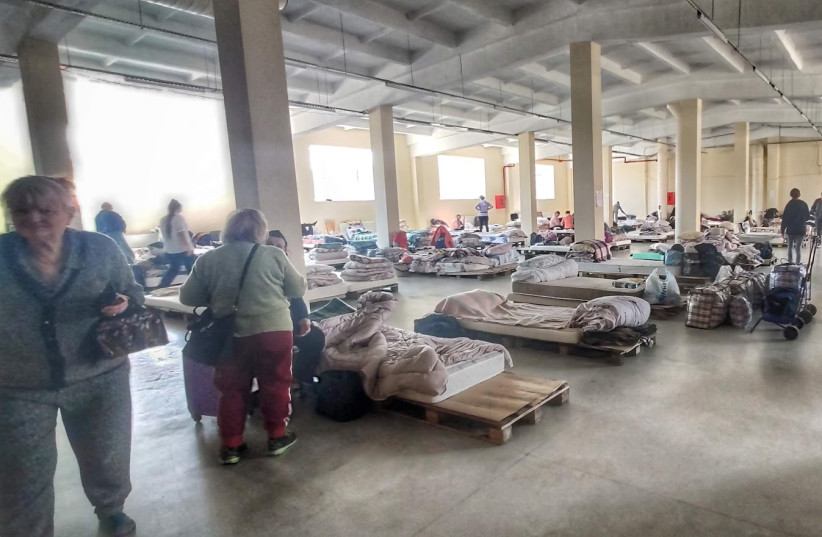On the Ukrainian border last month, a mother was finally reunited with her children. The woman, who already made aliyah to Israel a few years ago, sent her two small children to Mariupol before the war to spend time with their grandmother.
To say the timing was far from auspicious would be an understatement. When the war broke out, getting the grandmother and children out of Ukraine became increasingly difficult. Eventually, the grandmother dropped the two children, ages six and 10, at a refugee camp, where they were finally reunited with their mother.
The process of locating these refugees is not an easy one. How do we find them? How do we get them to cross the border in hazardous weather conditions while roads are literally being bombed by Russian troops? How do we find drivers willing to put themselves in harm’s way in order to get these people to safety?
For the past eight weeks, the Jewish Agency for Israel has led this process and helped make these kinds of reunions possible. And while that fact alone fills me with pride, it’s difficult to shake thoughts of two small children wandering a refugee camp alone, wondering why their grandmother abandoned them and when they would finally see their mother’s face again.
My 36 hours along the Ukrainian border a few weeks ago, where I was joined by the Jewish Agency’s acting chairman of the executive Yaakov Hagoel and CEO Amira Ahronoviz, was filled with a unique mixture of being uplifted by human resilience and dismayed by its callousness.

Yet, as we prepare to celebrate Independence Day, I continue to be impressed by the Jewish spirit permeating these places.
On our first day, we landed at a small airport along the Polish border where we were quite literally surrounded by US Patriot missiles – a clear sign that should this war escalate any further, not only the region but the world would be in a precarious situation. Those feelings of dread were finally alleviated when we made our way across the border into a Ukrainian field hospital.
The world is well acquainted with Israeli humanitarian aid initiatives in times of global crisis. But, here the challenge wasn’t only finding capable physicians, but finding ones who spoke either Ukrainian or Russian. Many Israeli doctors from the former Soviet Union volunteered their services. One by one, they told me it was an honor to give back to their native country and demonstrate to the Ukrainian people how much they were able to learn in Israel.
One of them also told me that the field hospital’s location was not a coincidence. More than 100 Israelis slept and served in this elementary school-turned field hospital facility in Mostyska, outside of Lviv. There, Jews are literally saving lives.
Nearly 80 years ago – at the very same spot – more than 2,000 Jews were rounded up, shot and buried in a mass grave. In rescuing Jewish refugees, the Jewish Agency is proud to be part of this extraordinary moment in which our people’s history comes full circle.
Not every story is a happy one, of course. Back in Poland, we visited a shopping mall that transformed into a large refugee relief center. There, among the kids happily playing and dogs frolicking, were exhausted adults unsure of where to go and what the future holds for them.
Ukrainian Jews, too, are burdened with this feeling of uncertainty. But, due to the miracle of Israel, many of them at least have somewhere to go.
To date, the Jewish Agency has brought more than 6,500 Ukrainians and 3,500 others from the region to Israel. In addition, Israel has welcomed 26,000 refugees from Ukraine. Time will tell how many of them will be acknowledged as olim and be permitted to stay.
Independence Day is a day of celebration. But, I would argue that every celebration demands reflection, as well. What did we accomplish this year? How can we do better?
For the rest of 2022, Israel and the Jewish Agency are preparing for the next step: proactively and efficiently absorbing these Ukrainian refugees we brought there into the fabric of Israeli society.
It will not be easy. Yet, Israel is a country not only built on immigration, but on people who came to our shores defeated, directionless and looking for salvation in the only place Jews are safe. Ahead of this Independence Day, I salute their courage and look forward to declaring together with them, “Am Yisrael Chai” (the nation of Israel lives).
The writer is chairman of the board of governors of the Jewish Agency for Israel.
